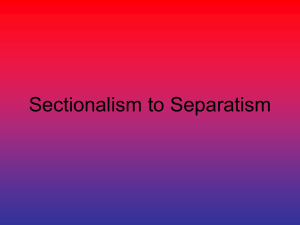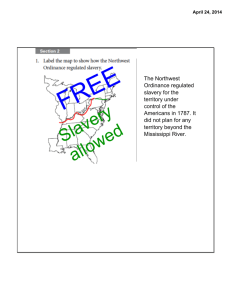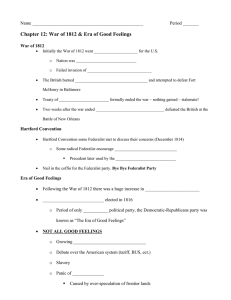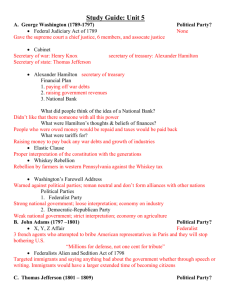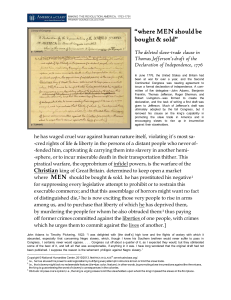Ch. 11-12 Jeffersonianism
advertisement
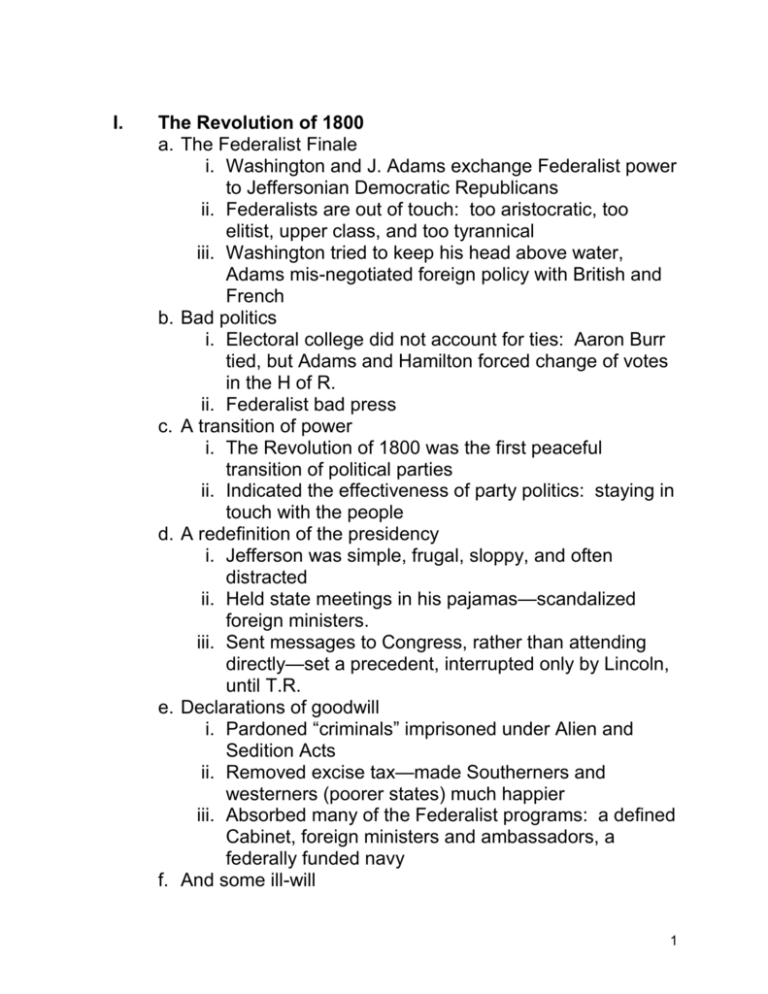
I. The Revolution of 1800 a. The Federalist Finale i. Washington and J. Adams exchange Federalist power to Jeffersonian Democratic Republicans ii. Federalists are out of touch: too aristocratic, too elitist, upper class, and too tyrannical iii. Washington tried to keep his head above water, Adams mis-negotiated foreign policy with British and French b. Bad politics i. Electoral college did not account for ties: Aaron Burr tied, but Adams and Hamilton forced change of votes in the H of R. ii. Federalist bad press c. A transition of power i. The Revolution of 1800 was the first peaceful transition of political parties ii. Indicated the effectiveness of party politics: staying in touch with the people d. A redefinition of the presidency i. Jefferson was simple, frugal, sloppy, and often distracted ii. Held state meetings in his pajamas—scandalized foreign ministers. iii. Sent messages to Congress, rather than attending directly—set a precedent, interrupted only by Lincoln, until T.R. e. Declarations of goodwill i. Pardoned “criminals” imprisoned under Alien and Sedition Acts ii. Removed excise tax—made Southerners and westerners (poorer states) much happier iii. Absorbed many of the Federalist programs: a defined Cabinet, foreign ministers and ambassadors, a federally funded navy f. And some ill-will 1 i. Attempted to impeach Federalist supreme court justices: as a result of “midnight judge” confirmations (Samuel Chase and William Marbury) ii. Poor management of pirate looting in the Atlantic g. The Supreme Court i. Marbury v. Madison: (1803) The principle of judicial review, or, just because you don’t like them, doesn’t mean you can get rid of them. ii. Establishes the Supreme Court as the impartial, nonpartisan protectors of the Constitution iii. Depends on strict/loose interpretation iv. Tests the system of checks and balances/separation of power and Articles I-III of the Constitution II. Jeffersonian domestic policy a. Strict interpretation of the Constitution i. No excessive power of any branch of government ii. Do not overuse “implied powers” b. The Louisiana Purchase i. Intent: 1. to create a buffer between Spanish North America and the United States, 2. to solidify relationships with Napolean and France, 3. to provide safe economic exchange along the Mississippi River ii. The Dilemma 1. Required an initial offering of $10 million, later purchased for $15 million (3 cents/acre) 2. Napolean needed money to bail out his deficit spending 3. Napolean forced to deal with L’Ouverture’s slave rebellion in Haiti 4. None of the land had been charted, and was overrun with Native Americans 2 5. No justification for the excessive use of Executive Power (contradicted his views of strict interpretation) 6. Difficult to settle and administer iii. The purchase 1. $15 million, a deal 2. Doubles the size of the USA 3. Sent Lewis and Clarke, and Zebulon Pike, to survey resources, waterways, and potential threat 4. Sparked a new American identity based on cheap land, settlement, an appreciation of the frontier, and self reliance iv. Eradication of Federalist legacy (see above) 3 III. Jefferson’s Foreign Policy a. France i. Generally positive ii. Purchase of Louisiana b. England i. Chesapeake affair ii. Impressments of naval seamen c. General policy i. Embargo Act (1807) prevent exportation of goods to England and France 1. Criticized for being too expensive 2. Underestimated Britain ii. Later repealed after Jefferson left (Non-Intercourse Act) IV. Overall Evaluation a. Strengths i. Modesty, simplicity, innovative, intellectual ii. Doubled size of the United States iii. Against tyranny in all forms b. Weaknesses i. Ineffective policy maker—foreign and domestic ii. Didn’t work well with Supreme Court iii. Reduced military and militia iv. Unresolved conflict with Britain, France, and the Pasha of Tripoli/Barbary Pirates. V. Madison and the Second War for Independence a. Background i. British continued to fortify and station troops on both sides of the Mississippi River, despite the Treaty of Paris (1783) ii. Embargo Act threatened to cut off trade iii. Petty skirmishes in the Atlantic during Jefferson’s admin. (Chesapeake affair) iv. British supported Great Plains Indians 4 v. The United States needed to test foreign policy, flex muscle, and try and gain rich Canadian lands b. The War of 1812 i. One of the worst fought wars in modern warfare history ii. The Americans were poorly prepared (partly because of a lack of funding and the decreased military under Jefferson, and poor leadership) iii. Major engagements 1. Oliver Perry thwarts British navy at Lake Erie 2. William Harrison defeats British at Battle of Thames 3. Thomas Macdonough challenges and beats British at Lake Champlain 4. Washington D.C. burned to the ground iv. Results 1. Andrew Jackson and William Harrison wins fame by protecting New Orleans (after a long campaign against the Creek Indians) 2. The British barely lost 3. American navy largely responsible for victory 4. The re-birth of American nationalism 5. Domestic production and manufacturing increase, spurring American economy 6. Death of the Federalist party after a failed attempt at secession/bad bargaining during the Hartford Convention 7. Finalized by the Treaty of Ghent VI. Rapid growth a. Louisiana Purchase b. Ohio Land Rush/Ohio Fever i. Cheap land provided to farmers and prospective settlers—signed a 5 year contract ii. Attractive to tobacco farmers who had exhausted their land c. Land Act of 1820 5 d. Florida Purchase Treaty of 1819 i. Due to revolutions against Spain throughout Latin America, Spain was forced to cede Florida in exchange for Texas ii. Andrew Jackson continued success in eradicating Natives: the beginning of the Trail of Tears, the forced relocation of Indian Tribes 1. Bio-warfare 2. Proto-reservations 6 VII. The Slavery Crisis a. Underpinnings i. Constitution forbade the slave trade after 1820. ii. Slaves account for 3/5 of a person for congressional apportionment iii. Loose Constitutional interpretation—nothing forbade the continuation of the slavery, as an institution. b. The rise of sectionalism i. Missouri for statehood 1. Applied for statehood, but as a slave state 2. Denied because of the Tallmadge Amendment which reaffirmed the end of the slave trade ii. Problems 1. To allow Missouri as a slave state would upset congressional balance and set a precedent for allowing slavery 2. To forbid slavery would deny the South their livelihood, would cripple the American economic dependence on raw materials, and would deny the policy of popular sovereignty iii. Resolution 1. Missouri Compromise a. Missouri=slave state b. Maine=free state 2. Postponed the problem, didn’t settle it (what if there were an odd amount of states?) 3. The Mason-Dixon Line3630’ a. North=free b. South=slave VIII. Improvements a. The American System i. Proposed by Henry Clay ii. Based on the Tariff of 1816, which sought to protect domestic production by making foreign goods too expensive iii. Called for 7 1. Strong protective tariffs 2. Proto-Industrialized manufacturing (centered in the Northeast—like Lowell, Mass.) 3. A federally funded program of roads and canals to move raw and finished goods, facilitate communication, and improve settlement. b. Problems i. Too expensive ii. Vetoed by Madison because it was not constitutionally protected (individual states were req’d to pay) iii. Opened the question of whether to protect the spread of slavery into the new territories. IX. The Era of Good Feelings a. A misnomer i. Plagued by economic woes (Panic of 1819, inflation skyrocketed with no set currency) ii. Slavery crisis came to boil with Tallmadge AmendmentMissouri Compromise iii. Cheap land and the rapid expansion of the frontier resulted in more “property holders”, causing apportionment problems, suffrage issues, and banking problems iv. Chronic problems with Natives resulted in forced relocation, concentration camps, and a programme of genocide b. Accurate term i. More (white men) were gaining access to political participation, regardless of upbringing, education, or experience ii. Land was cheap, fertile, and easily available iii. POTENTIAL, POTENTIAL, POTENTIAL 8


